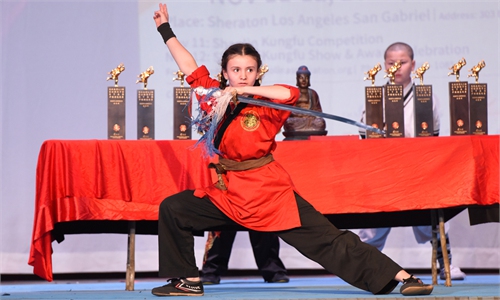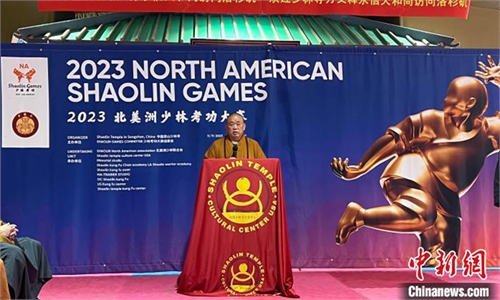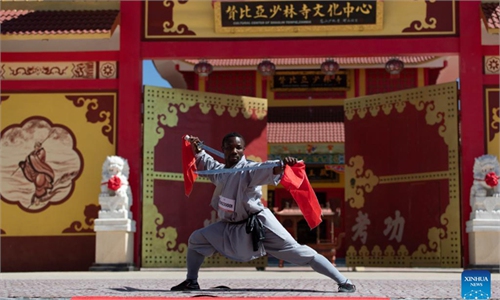ARTS / CULTURE & LEISURE
Kung fu party: 1,500-year-old Shaolin Temple becomes hotbed for cultural exchange, integration
Shaolin Temple becomes hotbed for cultural integration
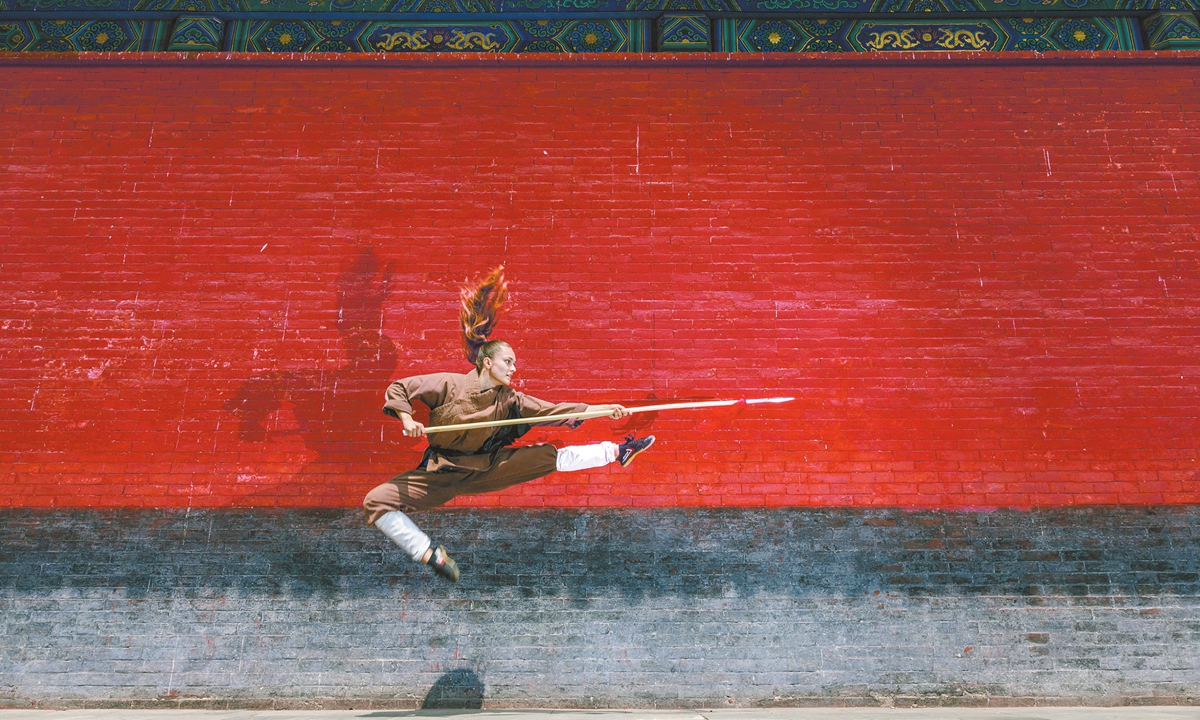
A foreign kung fu lover participates in the 2024 Shaolin Games Finals in the Shaolin Temple in Dengfeng, Central China's Henan Province on July 13, 2024. Photo: Li Hao/GT
A global gathering of kung fu masters, not for combat but in the spirit of friendship and unity, took place at the Shaolin Temple - the cradle of Shaolin martial arts.
The 2024 Shaolin Games Finals took place in the Shaolin Temple in Central China's Henan Province recently, gathering hundreds of participants from six continents to compete for the global kung fu star title, while serving as platform for cultural exchange and making friends.
"This event, a platform provided by the Shaolin Temple, allows disciples from around the world to come together, engage in horizontal exchanges and share experiences. This gathering enhances their confidence in Shaolin culture," Shi Yongxin, the abbot of the Shaolin Temple, told the Global Times.
Shaolin kung fu, therefore, plays a significant role in fostering cultural exchange and mutual appreciation. The culture promotes physical well-being, mental happiness and spiritual satisfaction, contributing positively to the family, society and various aspects of life, according to the abbot.
Global gathering
Over the past weekend, a total of 144 martial art masters from 47 countries and regions competed in the finals of the 2024 Shaolin Games, contending for the title of "2024 World Shaolin Kung Fu Star." Along with them were hundreds of kung fu lovers gathering to show their skills, share their personal journeys and meet their peers.
The games included ranking matches, advancement matches, and the final round, with competition events including Shaolin boxing techniques and Shaolin weaponry, the Global Times learned from the temple.
"The Shaolin Games finals are not about competition of winning or losing, nor a contest of victory or defeat, but moments of life awakening, team development, and the inheritance and enrichment of the Shaolin spirit," Shi said, expressing his hope that the event would "foster cross-cultural exchanges, enhance mutual appreciation of civilizations, and contribute to the well-being, health and peace of humanity."
At the competition venue, fists and feet stirred the air, while participants whirled, creating a dynamic display of martial prowess. Blades and spears gleamed, as contestants showcased their skills, fully embodying the charm of Shaolin kung fu.
After two days of fierce competition, 10 contestants from China, the US, Australia, Austria, the Czech Republic, Zambia, Peru and other countries were crowned as the "2024 World Shaolin Kung Fu Stars."
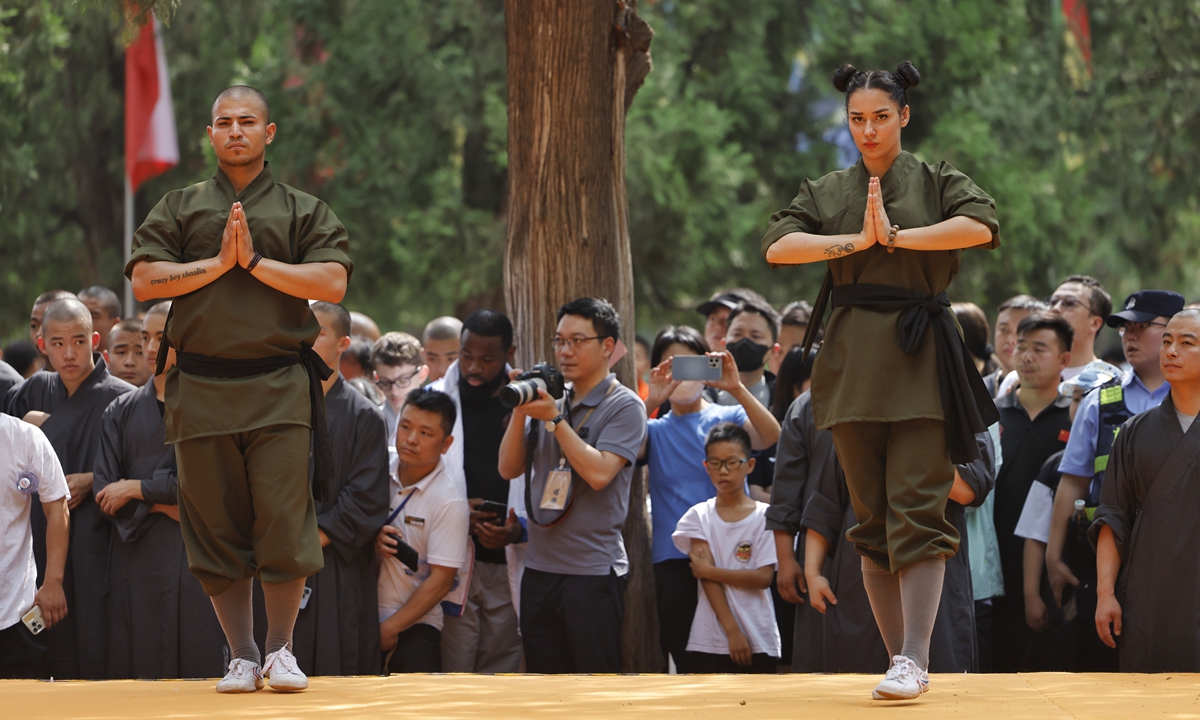
Foreign kung fu lovers participatesin the 2024 Shaolin Games Finals in the Shaolin Temple in Dengfeng, Central China's Henan Province on July 13, 2024. Photo: Li Hao/GT
A minute on stage takes 10 years of practice off stage. As one of the competitors aptly put it, "Winning the championship is but a fleeting moment, whereas practicing martial arts is a lifelong pursuit."In 2023, the Shaolin Temple held the continental kung fu competitions across six continents in one year. Tens of thousands of kung fu practitioners of different races, colors and ages participated, with competitors from 101 countries gathering in Zambia, Singapore, Argentina, the US, Italy and Australia to compete.
During the Shaolin Games finals, various events have also been held at the Shaolin Temple, including overseas kung fu performances and a conference on the transmission and innovation of Shaolin kung fu's intangible cultural heritage, providing visitors with opportunities to experience and study Shaolin culture.
The Shaolin Temple, located on the Songshan Mountain in Dengfeng, Henan, is one of the world's most famous Buddhist temples. It was first established in 495 by Emperor Xiaowen of the Northern Wei Dynasty (386-534) to accommodate the Indian monk Batuo.
In 1982, the kung fu movie Shaolin Temple starring Jet Li, became so popular across the nation that the legendary temple and its martial art instantly became one of Chinese cultural icons both at home and abroad.
The temple is now renowned for its long history, profound cultural heritage, unique Buddhist elements, and martial art traditions. It is not only a treasure of Chinese Buddhist culture but also an important part of the world's cultural heritage.
Following China's reform and opening-up, Shaolin kung fu has been promoted worldwide through the establishment of the Shaolin Temple's Martial Monks Troupe, successful UNESCO heritage listing and international tours.
Additionally, more than 200 Shaolin Cultural Centers have been set up globally, offering courses on kung fu, wellness and Chinese culture, significantly expanding its international presence and influence.
In recent years, the Shaolin Temple has been actively developing and promoting competitive martial arts disciplines that encapsulate its rich heritage and align with contemporary athletic values. These initiatives are designed to innovate and revitalize traditional practices, making them accessible and engaging for global audiences.
A big family
Over past decades, Shaolin kung fu has gained global popularity, offering physical and spiritual benefits to its numerous practitioners.
It is estimated that there are about 100 million Shaolin disciples, Shaolin culture enthusiasts and practitioners of Shaolin kung fu worldwide, and among which approximately 60 million are located overseas, as reported by the China News Service.
Fernando Huanacuni Mamani, the former foreign minister of Bolivia, is a prime example of this spirit. Carrying a "kung fu dream," he studied at the Shaolin Temple for three years, deeply influenced by Chinese culture. He has passed on this passion to his children, inspiring the next generation.
"Having competition is a great way (not only) to test yourself, challenge yourself, but also to see where you stand in the scheme of things in your level and across the world," said Ramesh Patel, the Australian team leader, who has practiced kung fu for more than 30 years.
"It's a great opportunity for people to come back to the birthplace of kung fu and experience being part of the Shaolin family, which truly exemplifies the spirit of cultural exchange," Patel said.
Selay Marius Kouassi, a participant from Côte d'Ivoire and also head of the Team Africa, told the Global Times that, "I'm very happy to be part of the global community - not just a local, regional, or national community, but a global one. Shaolin (kung fu) has united us as one big family all over the world.
"I especially love the Chinese wisdom that says 'Tian Xia Yi Jia' - the concept that the whole world is one family. This is truly who we are, and it is because of Shaolin kung fu," he said.
"Culture is a shared treasure, and the practice of kung fu, like any cultural or sports activity, is about individual enlightenment, clientele and effort, unrelated to conflicts or confrontations," Shi remarked.

